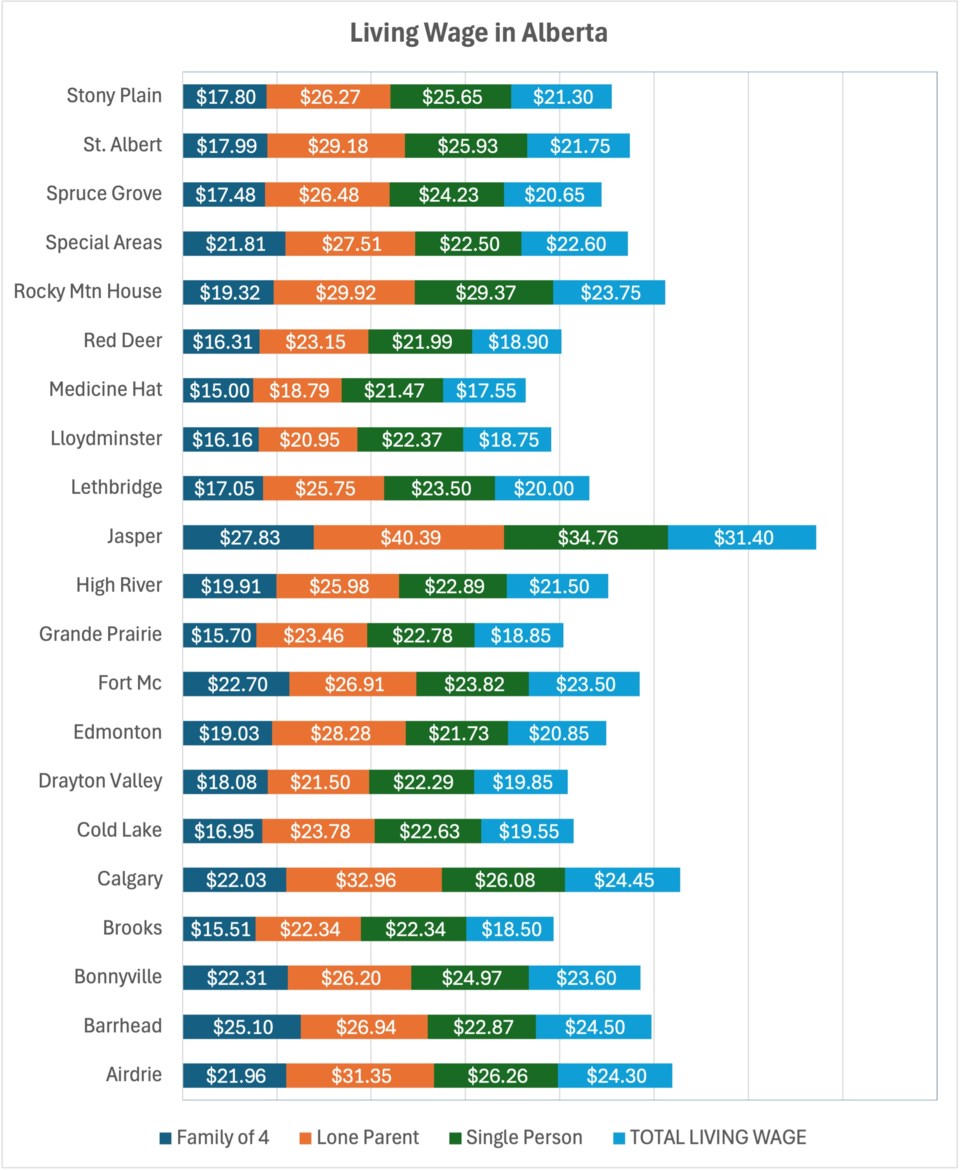LAKELAND - It costs more to live in Bonnyville than in Cold Lake, but a living wage in both communities is well above the provincial minimum wage of $15 per hour, according to the 2024 Alberta Living Wage Report.
A person living in Bonnyville needs to earn an average of $23.60 per hour, while someone in Cold Lake needs to earn an average of $19.55 per hour, reads information in the recently released report.
“The living wage is defined as the hourly wage a worker needs to earn to cover their basic expenses and participate in the community,” according to the Alberta Living Wage Network, the organization that authors the annual report. Alberta Living Wage Network is group of community organizations and municipalities who share the goal of a living wage for employees across the province.
Its council includes a couple of Lakeland groups such as Lac La Biche County and Lakeland Credit Union.
The report assumes a 35-hour work week and offers calculations for a dual-income family of four, a single parent, and a single person.
In Alberta, the minimum wage is $15 per hour, unless you are a student under the age of 18 ($13/hour); a salesperson ($598/week); or a domestic employee who lives in their employer’s home ($2,848 month). The province’s minimum wage has been frozen since 2018.
Executive Director of the Bonnyville Chamber of Commerce Serina Lyons was surprised to see such a dramatic difference in the living wages for Cold Lake and Bonnyville.
“There should not be a $4 discrepancy,” said Lyons.
She said it’s important to look at studies like this with a critical mind.
“Say if the province of Alberta said, ‘Let's increase minimum wage to meet at least the lowest living wage in our province,’ that that would have far reaching effects on our small businesses. If the small businesses don't exist to create employment and job opportunities, then it doesn't matter what the minimum wage is,” said Lyons.
She believes it's important for people to upskill through education and training so they can move on to more skilled labour positions.
City of Cold Lake Mayor Craig Copeland said he’s not surprised Cold Lake is more affordable than some of the other communities the report looked at.
“We have free transit. And this is the purpose of the free transit in Cold Lake - we provide a source of transportation for people that do not have a vehicle or don't have a second vehicle. So that helps in keeping our cost down for people that live here,” said Copeland.
Looking at the report’s detailed breakdown of costs in Cold Lake and Bonnyville, transportation isn’t the only area where Cold Lake is cheaper, but it is the budget line with the most impact, with savings of roughly $3,000 to $7,000 for a family of four, single parent, or individual.
Lyons noted that the Town of Bonnyville is much more condensed than Cold Lake is.
“Depending on where you live in Bonnyville, many things are walking distance, as long as it's not minus 35,” said Lyons.
While shelter costs in Cold Lake are higher than in Bonnyville, they are also more affordable than in major centres like Edmonton or Calgary. Copeland said he expects that to change when construction begins on the super hangar at 4 Wing Cold Lake.
“They're talking 500 to 800 construction workers coming into town eventually. So that absorption of those people, certainly hotels, but also the rentals, that'll really tighten up the market,” said Copeland.
Bonnyville-Cold Lake-St. Paul MLA Scott Cyr says the provincial government is deeply committed to addressing affordability across the province through measures such as $9 billion in investments in affordable housing, encouraging residential housing construction, and modernizing the electricity system. The report notes that regulated electricity rates have decreased significantly “from 19.396 cents per kWh in October 2023 to 9.937 [cents per kWh] in October 2024.”
“These measures demonstrate our commitment to improving affordability for Albertans, including addressing concerns around living wages in communities like Bonnyville and Cold Lake,” said Cyr.
The communities of St. Paul, Lac La Biche and Elk Point were not included in this year’s Living Wage Report.



